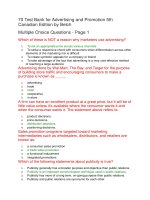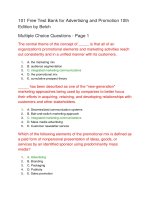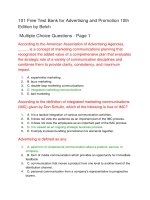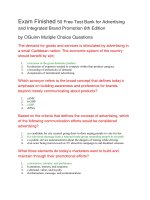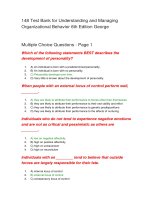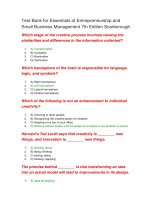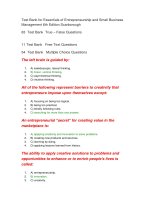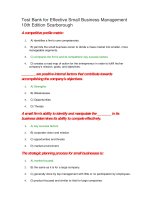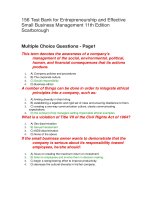156 test bank for entrepreneurship and effective small business management 11th edition scarborough
Bạn đang xem bản rút gọn của tài liệu. Xem và tải ngay bản đầy đủ của tài liệu tại đây (182.61 KB, 28 trang )
156 Test Bank for Entrepreneurship and Effective
Small Business Management 11th Edition
Scarborough
Multiple Choice Questions - Page1
This term denotes the awareness of a company's
management of the social, environmental, political,
human, and financial consequences that its actions
produce.
1.
2.
3.
4.
A) Company policies and procedures
B) The corporate culture
C) Social responsibility
D) Business ethics
A number of things can be done in order to integrate ethical
principles into a company, such as:
1.
2.
3.
A) limiting diversity in their hiring.
B) establishing a legalistic and rigid set of rules and ensuring obedience to them.
C) creating a one-way communication culture, clearly communicating
expectations.
4. D) the conduct of top managers setting impeccable ethical examples.
What is a violation of Title VII of the Civil Rights Act of 1964?
1.
2.
3.
4.
A) Sex discrimination
B) Sexual harassment
C) AIDS discrimination
D) None of the above
If the small business owner wants to demonstrate that the
company is serious about its responsibility toward
employees, he/she should:
1.
2.
3.
4.
A) focus on creating the maximum return on investment.
B) listen to employees and involve them in decision making.
C) begin a reengineering effort to improve productivity.
D) decrease the cultural diversity in his/her company.
There are a number of "tests" of ethical behavior in
business. The one that prioritizes choosing the option
that results in the greatest good for the greatest
number of people is known as:
1.
2.
3.
4.
A) the utilitarian principle.
B) the professional ethic.
C) the Golden Rule.
D) Kant's categorical imperative.
Ricardo disapproves of an advertising campaign featuring
scantily clad models in suggestive poses with his
company's product. Ricardo is practicing ________
ethical management.
1.
2.
3.
4.
A) immoral
B) amoral
C) moral
D) socially irresponsible
Once a manager recognizes the ethical dimensions involved
in a dilemma or decision, his/her next step in
establishing a workable ethical framework to guide
him/her would be to:
1.
2.
3.
4.
A) identify key stakeholders and assess how the decision will affect them.
B) generate alternative choices.
C) distinguish between ethical and unethical responses to the situation.
D) determine who is most responsible for making and implementing the decision.
"Everybody does it." is an example of:
1.
2.
3.
4.
A) moral blindness.
B) justice.
C) consequences and outcomes.
D) public justification.
The practice of moral management by the small business
generally results in:
1.
2.
3.
4.
A) a stronger competitive position.
B) a weaker competitive position.
C) increased governmental scrutiny of the company's business practices.
D) lower operating costs and increased employee satisfaction.
Managing diversity begins with:
1.
2.
A) concentrating on communication.
B) recognizing your own biases and stereotypes.
3.
4.
C) valuing diversity as a core company value.
D) assessing your company's diversity needs.
Ethical lapses caused by a chance to "get ahead" by taking
some unethical action come about because of:
1.
2.
3.
4.
A) a "bad apple."
B) a "bad barrel."
C) opportunity pressures.
D) competitive pressures.
A company's suppliers are:
1.
2.
3.
4.
A) stockholders.
B) bondholders.
C) stakeholders.
D) None of the above
________ are the various groups and individuals who affect
and are affected by a business.
1.
2.
3.
4.
A) Consequentialists
B) Workers
C) Stakeholders
D) Objectivists
To cope successfully with the many ethical decisions they
face, entrepreneurs must develop a ________ ethical
framework to guide themselves and the organization.
1.
2.
3.
4.
A) loose
B) workable
C) tight
D) flexible
Cultural diversity in the small business brings several
benefits to its owner, including:
1.
2.
3.
A) less government scrutiny of his/her business practices.
B) local and state tax breaks.
C) a smaller but better educated and skilled labor force from which to hire new
employees.
4. D) a rich blend of perspectives, skills, and talents.
The ultimate decision on whether to abide by ethical
principles in any given situation rests with:
1.
2.
3.
4.
A) the manager.
B) the business owner.
C) the individual.
D) stakeholders.
________ involves the moral values and behavioral
standards that businesspeople draw on as they make
decisions and solve problems.
1.
2.
3.
4.
A) Business ethics
B) Social responsibility
C) Moral responsibility
D) Law
A ________ defines the values underlying the entire
company and its ethical responsibilities to its
stakeholders.
1.
2.
3.
4.
A) fidelity
B) promise-keeping
C) company credo
D) code of ethics
Over the past few decades, business leaders have, in
general, become more proactive in terms of
implementing the organizational characteristics of:
1.
2.
3.
4.
A) moral management.
B) amoral management.
C) immoral management.
D) ethical norms.
Perhaps the best way to deal with the environmental
challenges we face would be to:
1.
2.
3.
4.
A) create redesigned, "clean" manufacturing systems.
B) conduct corporate education programs on the issues for employees.
C) revert society to a simpler, more environmentally friendly economy.
D) enhance efforts at recycling existing waste.
A company "Code of Ethics" refers to:
1.
A) the awareness of a company's management of the social, environmental,
political, and human, as well as the financial, consequences that its actions
produce.
2. B) the moral values and behavioral standards business people employ daily when
making decisions and solving problems.
3. C) a formal statement of the standards of behavior and ethical principles a
company expects its employees to abide by.
4. D) the process of bringing land, labor, and capital together, and of assuming the
risks involved in producing a good or service in the hope of making a profit.
The concept of social responsibility has evolved from that of
a nebulous "do-gooder" to one of:
1.
2.
3.
4.
A) "law follower."
B) "social steward."
C) "moral steward."
D) "law abider."
The various groups who affect and are affected by the
decisions and actions of a small business are called:
1.
2.
3.
4.
A) suppliers.
B) stakeholders.
C) minorities.
D) intermediaries.
Managing diversity in the workforce means managers need
to:
1.
2.
3.
4.
A) hire more minorities and fewer non-minorities.
B) create an environment in which all types of workers can flourish.
C) establish affirmative action programs.
D) strive for more homogeneity in the workforce.
Ethical lapses happen for a number of reasons. Joan made
an unethical decision. When confronted with it by her
boss, she couldn't understand why he was upset
because "Everyone does it." This is an example of an
ethical lapse due to:
1.
2.
3.
4.
A) a "bad apple."
B) a "bad barrel."
C) opportunity pressures.
D) competitive pressures.
________ dilemmas lurk in even the most mundane
decisions that entrepreneurs make every day.
1.
2.
3.
4.
A) Legal
B) Ethical
C) Spiritual
D) Global
Which one of the following is a company's stakeholder?
1.
2.
3.
4.
A) Employees
B) Unions
C) Investors
D) All of the above
Robin works hard at acting on principle and conviction and
striving to do the honorable thing. Robin is guided by
the ethical principle of:
1.
2.
3.
4.
A) honesty.
B) integrity.
C) fidelity.
D) fairness.
The entrepreneur can implement and maintain ethical
standards by:
1.
2.
3.
4.
A) performing periodic ethical audits.
B) making examples of clearly visible violators.
C) handing down a strict code of ethics established by upper management.
D) doing all of these.
The ethical standards test of ethical behavior in businesses
that prioritizes acting in such a way that the action
taken under the circumstances could be a universal
law or rule of behavior is called:
1.
2.
3.
4.
A) the family test.
B) the professional ethic.
C) the Golden Rule.
D) Kant's categorical imperative.
If your ethical conduct is based on treating other people the
way you expect them to treat you, you are using:
1.
2.
3.
4.
A) the family test.
B) the professional ethic.
C) the Golden Rule.
D) Kant's categorical imperative.
Doing what is "right" as opposed to what is "wrong" is:
1.
2.
3.
4.
A) the law.
B) ethical behavior.
C) legal behavior.
D) business behavior.
Those who can most influence individual behavior within a
small company and set the moral and ethical tone of a
company are its:
1.
2.
3.
A) customers.
B) managers or owners.
C) employees.
4.
D) human resource managers.
The moral values and behavioral standards business people
employ daily when making decisions and solving
problems are known as:
1.
2.
3.
4.
A) social responsibility.
B) business ethics.
C) the corporate culture.
D) the company policies and procedures.
68 Free Test Bank for Entrepreneurship and
Effective Small Business Management 11th
Edition Scarborough Multiple Choice
Questions - Page2
Marian works in an office where the male employees
constantly tell sexually oriented jokes, some keep
suggestive pictures on the walls of the cubicles, and
several men whistle at and make lurid comments to
women employees in the lunch room. This is an
example of what type of sexual harassment?
1.
2.
3.
4.
A) Quid pro quo
B) Hostile environment
C) Harassment by a third party
D) None of these
When it comes to monitoring electronic communication,
especially e-mail:
1.
2.
3.
4.
A) 80% of all organizations read employees' e-mail.
B) supervisors may not read employees' e-mail without cause.
C) only 15% of all companies have policies governing the use of e-mail.
D) most employees don't know employers may read their e-mail without
permission.
Leonard Stern, the chairman of Hartz Mountain, was
concerned and outraged at the condition of New York
City's homeless living in shelters and welfare hotels,
and was determined to help them. Hartz Mountain
backed loans for construction of clean, safe housing
complexes, and helped create social programs to help
homeless families. These efforts by Hartz Mountain are
an example of a company's social responsibility to:
1.
2.
3.
4.
A) consumers.
B) investors.
C) employees.
D) the community.
Companies can avoid drug and other related problems by
including several key elements in the company drug
program, such as:
1.
2.
3.
A) drug testing all employees periodically regardless of need.
B) having a written substance abuse policy.
C) turning supervisors into "drug police" by having them watch employees for
signs of substance abuse.
4. D) including all of these in the drug program.
Joan was hired as a sales representative. One of her
responsibilities was to make outside sales calls. Over
the years, she got friendly with her customers. One of
the customers has been asking her for a date for a
while and finally told her that she will not be getting
any orders unless she goes out with him.
1.
2.
3.
A) This is in violation of sexual harassment and Joan can sue the customer.
B) This is in violation of sexual harassment and Joan can sue her employer.
C) This is not in violation of sexual harassment because the employer was not
negligent.
4. D) This is not in violation of sexual harassment because Joan liked the customer
very much.
What is an EAP?
1.
2.
A) It is a drug testing program for small businesses.
B) It is a program to help employees with substance abuse and other types of
personal and family problems.
3. C) It is an HIV screening process used in the recruiting process.
4. D) It is a type of diversity management program.
A ________ is a written statement of the standards of
behavior and ethical principles a company expects
from its employees.
1.
2.
3.
4.
A) fidelity
B) promise-keeping
C) code of ethics
D) company credo
Sexual harassment is a serious problem in the workplace
and:
1.
A) about 40% of all sexual harassment in the workplace is done by females to
males.
2. B) is especially bad in small businesses.
3. C) employers are only liable if the sexual harassment is "quid pro quo."
4. D) more than 80% of the charges are brought by women.
When dealing with AIDS in the workplace, small business
owners should:
1.
A) treat AIDS-positive employees as they would any other employees with life
threatening illnesses.
2. B) make certain their employment policies comply with local regulations but not
worry about federal regulations.
3. C) require HIV screening as part of the hiring process.
4. D) inform all employees when someone tests HIV positive.
The Audi 5000 sedan was reported to have sudden, violent
acceleration when the transmission was put into drive.
Audi first blamed the condition on drivers who didn't
know how to operate the transmission, but later was
forced to recall the sedan and correct the transmission
problem. Audi violated which area of responsibility
businesses have to their customers?
1.
2.
3.
4.
A) Dependable packaging
B) Product safety and quality
C) Truthful advertising
D) Investor confidence
E. F. Hutton and Co. was convicted of the violation of kiting
laws. Check kiting is an illegal practice involving the
writing checks against money that has not arrived at
the bank on which the check is drawn. Doing this
violated their business responsibility in terms of:
1.
2.
3.
4.
A) product quality.
B) the consumer's right to know.
C) their investors.
D) the community.
Small businesses have a number of responsibilities to their
investors including:
1.
2.
3.
4.
A) selling a high-quality product at a reasonable price.
B) observing all government requirements for product manufacture.
C) earning the lowest profits at the highest cost of production.
D) providing an attractive return on their investments.
The greater the reward or the smaller the penalty for
unethical acts, the greater is the probability that such
behavior will occur. This refers to:
1.
2.
3.
4.
A) competitive pressures.
B) opportunity pressures.
C) globalization pressures.
D) personal pressures.
________ is any unwelcome sexual advance, request for
sexual favors, and other verbal or physical sexual
conduct made explicitly or implicitly as a condition of
employment.
1.
2.
3.
4.
A) Hostile harassment
B) Quid pro quo harassment
C) Non-employee sexual harassment
D) Sexual harassment
In the recent Supreme Court ruling in Burlington Industries
vs. Ellerth, the court held:
1.
2.
A) employers were no longer liable for third-party sexual harassment.
B) there does not have to be a superior-subordinate relationship for harassment to
occur.
3. C) complainants must prove intent to harass on the part of the harasser.
4. D) employers are automatically liable if supervisors take tangible employment
action toward the person they are harassing.
Citicorp was found guilty of violating parking laws. Parking
involves complex shifts of funds between countries to
avoid the payment of taxes. Citicorp maintained two
sets of financial records for a parking scheme. These
actions violate which area of business responsibility?
1.
2.
3.
4.
A) Investors
B) Consumers
C) Community
D) Product quality
Business ethics consist of the fundamental ________ values
and behavioral standards that form the foundation for
the people of an organization as they make decisions
and interact with stakeholders.
1.
2.
3.
4.
A) religious
B) moral
C) societal
D) legal
Barker Industries makes an annual donation of $100,000 to
local charities, and allows its top managers leaves of
absence to serve charities involved in community
service. What area of social responsibility is Barker
demonstrating?
1.
2.
3.
4.
A) Customers
B) Environment
C) Employees
D) Community
A(n) ________ is a company-provided benefit designed to
help reduce workplace problems such as alcoholism,
drug addiction, a gambling habit, and other conflicts
and to deal with them when they arise.
1.
2.
3.
4.
A) employee assistance program (EAP)
B) substance abuse policy
C) drug testing program
D) employee education program
The ________ suggests that the channels of communication
between companies and their customers run in both
directions.
1.
2.
3.
4.
A) right to education
B) right to be heard
C) right to know
D) right to choice
If a manager is made aware of a sexual harassment problem,
he/she should:
1.
2.
3.
4.
A) immediately fire the person accused of the harassment.
B) ask the complainant to approach the harasser and try to work it out.
C) listen carefully and investigate quickly and thoroughly.
D) make all and any findings public to protect all parties.
Regarding sexual harassment, employers should realize that
they:
1.
2.
A) can be held responsible for third-party sexual harassment.
B) are protected from liability if they are aware of a harassment problem, even if
they don't take action.
3. C) are not liable for sexual harassment in the workplace if they have a formal
policy against it.
4. D) are not liable if they didn't know it was taking place, even if one could
reasonably expect them to know.
Which of the following statements is correct?
1.
A) Entrepreneurs must recognize that actions taken which conflict with society's
ethical standards incur a very high price.
2. B) The reputation of a business can be harmed severely by the actions of a single
employee. Trust, once broken, is difficult to mend.
3. C) Customers are not likely to do business with a firm with whom they feel treated
them in an unethical fashion.
4. D) All of the above
Businesses have which of the following responsibilities to
their customers?
1.
2.
3.
4.
A) The right of choosing the products they buy and use
B) Properly managing a diverse workforce
C) Reducing packaging, reusing material, and recycling when possible
D) Earning a profit while being socially responsible
Business ethics consist of:
1.
A) the legal state that is embodied in the employment manual and policy and
procedures.
2.
B) the fundamental moral values and behavioral standards that form the
foundation for the people of an organization as they make decisions and interact
with stakeholders.
3. C) the fundamental moral values and behaviors specifically for employees only.
4. D) None of the above
To create an environment for your people that facilitates
ethical behavior, an entrepreneur should:
1.
2.
3.
4.
A) set the tone and establish and enforce policies.
B) not need to educate.
C) punish whistle blowers.
D) All of the above
The small business owner can successfully manage
diversity in his/her business by:
1.
2.
3.
4.
A) avoiding invalid assumptions.
B) placing managers of the same gender or ethnic origin over workers.
C) treating all employees the same regardless of their cultural background.
D) setting quotas or goals for how many individuals from different groups should
work in the company.
A ________ is one in which continuing unwelcome sexual
conduct in the workplace interferes with an
employee's work performance.
1.
2.
3.
4.
A) hostile environment
B) illegal environment
C) sexual environment
D) None of the above
A few examples of small businesses giving back to the
community are:
1.
2.
3.
4.
A) literacy programs.
B) food bank programs.
C) clean environment programs.
D) All of the above
A key determinant of ethical behavior is:
1.
2.
3.
4.
A) training.
B) law.
C) society.
D) All of the above
A company's AIDS policy should include:
1.
A) an open communication policy where all employees will be informed if someone
becomes ill.
2. B) a continuation of employee benefits as any other employee would have.
3.
4.
C) process for dismissal of the affected employee.
D) All of these
Mary started her dot.com business in 2005. Recently, she
hired Jackie as VP of Sales and Marketing. As part of
company policy, management was to give a blood test
for verification of AIDS or any drug abuse. When the
results came back, Mary found out that Jackie had
AIDS. She was fired because the company does not
tolerate having employees with AIDS.
1.
A) Mary had the right to fire Jackie because it is her company and she can do
whatever she wants.
2. B) Mary should have consulted with an attorney to find a reason for firing Jackie.
3. C) Mary is in violation of discrimination laws.
4. D) Mary should have requested a blood test from everyone on a quarterly basis.
The advertisement and resulting product, "A psychically
energized weight loss program," which turned out to
be a book on how to achieve a positive mental attitude,
violates which responsibility to the customer?
1.
2.
3.
4.
A) The right to know
B) The right to safety
C) The right to be heard
D) the right to choose
An entrepreneur's ________ and ________ influence the way
she leads her firm through every decision that is
made; every policy written; and every action taken.
1.
2.
3.
4.
A) personal values; beliefs
B) management; family
C) management; finances
D) None of the above
True - False Questions - Page 1
The best insurance against ethical violations is the hiring of
people with strong moral principles.
1.
2.
True
False
The most effective way of diminishing moral blindness is
through training.
1.
True
2.
False
When it comes to carrying out its social responsibility, one
of the most important constituencies to the small
business is its employees.
1.
2.
True
False
Since ethical decisions are based on absolute standards of
conduct, it is unimportant to identify the stakeholders
in any specific decision when determining the ethical
thing to do.
1.
2.
True
False
Kant's categorical imperative advises managers to take only
those actions that a disinterested panel of professional
colleagues would view as proper.
1.
2.
True
False
Although companies set standards for ethical behavior, the
ultimate decision on whether to abide by ethical
principles rests with the individual.
1.
2.
True
False
In most situations, the ethical dilemma is clear-cut and
obvious.
1.
2.
True
False
Since ethical standards are constant from one culture to
another, ethical decisions pose no special problems
for companies engaged in international business.
1.
2.
True
False
Businesses have social responsibility to several
constituencies: the environment, their employees,
their shareholders, the community, and their
customers.
1.
True
2.
False
One "break" small business gets over large companies is a
significantly lower rate of substance abuse due to the
"family-like" atmosphere that tends to prevail in small
companies.
1.
2.
True
False
In terms of ethical behavior, the law merely establishes the
minimum standard of behavior.
1.
2.
True
False
The first step in developing an ethical framework is to
identify the key stakeholders.
1.
2.
True
False
Effective drug prevention programs use random drug tests
of employees and keep their drug policies unwritten
for maximum flexibility.
1.
2.
True
False
The only way to achieve diversity in the small business is to
let it take care of itself as society increases in
diversity.
1.
2.
True
False
The starting point for managing diversity is learning your
own biases and prejudices.
1.
2.
True
False
The majority of small companies realize they have as big a
drug problem with their employees as larger
companies do.
1.
2.
True
False
Clean manufacturing systems stress recycling and reducing
of materials.
1.
2.
True
False
One of the most important groups of stakeholders that a
business must satisfy is its customers.
1.
2.
True
False
There is no universal answer for resolving ethical dilemmas.
1.
2.
True
False
The increasing cultural diversity in the United States is
hindering the entrepreneurial effort in the economy.
1.
2.
True
False
Polls show that increasingly the public is only holding
companies accountable for the economic impact of
their decisions, not the ethical implications.
1.
2.
True
False
Stakeholders are the individuals and groups affected by a
decision.
1.
2.
True
False
The policies and procedures concerning ethical behavior in
an organization serve as specific guidelines for people
as they make daily decisions.
1.
2.
True
False
While corporate culture influences employees' ethical
decisions, managers have little impact on those
decisions.
1.
2.
True
False
If a company has a written code of ethics and provides clear
instructions to employees, two-way communication is
unimportant in maintaining ethical standards.
1.
2.
True
False
If a small business owner obeys the law, he/she can be
certain that his/her actions are ethical.
1.
2.
True
False
The management of diversity will require ongoing
adjustments of your company to your workers.
1.
2.
True
False
Small business owners seldom feel the pressure to violate
ethical standards or to take shortcuts in their careers.
1.
2.
True
False
The five-step process for developing an ethical framework is
very similar to the process for problem-solving in
business.
1.
2.
True
False
Companies have the responsibility to provide investors with
an attractive return on their investment.
1.
2.
True
False
Managing cultural diversity in the workforce is getting easier
as society becomes more diverse.
1.
2.
True
False
It is important that any ethical code is enforced fairly and
consistently.
1.
2.
True
False
Building a reputation for ethical behavior typically takes a
long time.
1.
2.
True
False
Consumers have the right to honest communication about
the products and services they buy and the companies
they buy them from.
1.
2.
True
False
Ethics are the fundamental moral values and behavioral
standards that form the foundation for the people of an
organization as they make decisions and interact with
stakeholders.
1.
2.
True
False
To establish and maintain the highest level of ethical
standards, the company's owner should hand down
the company's ethical standards and require managers
to enforce them.
1.
2.
True
False
The use of random drug testing by small businesses is on
the rise.
1.
2.
True
False
Fortunately, for businesses, it only takes a short time to
build a reputation and it takes a long time to destroy it.
1.
2.
True
False
If a manager says things like, "Everyone does it" or "I don't
get paid to be ethical, I get paid to produce results,"
he/she is suffering from moral blindness.
1.
2.
True
False
76 Free Test Bank for Entrepreneurship and
Effective Small Business Management 11th
Edition Scarborough True - False Questions Page 2
Businesses have a responsibility to the communities in
which they operate, according to your authors.
1.
2.
True
False
Employers should not keep employees' medical records
strictly confidential.
1.
2.
True
False
Competitive pressures assumes that the greater the reward
or the smaller the penalty for unethical acts, the
greater is the probability that such behavior will occur.
1.
2.
True
False
When a manager receives a complaint about sexual
harassment, his/her first step should be to keep the
complaint casual and urge the complainant to return to
the alleged harasser her/himself and deal with the
issue that way first.
1.
2.
True
False
Employers can be held responsible for third-party sexual
harassment if managers knew about it or should have
known about it.
1.
2.
True
False
Most small business owners know exactly what their legal
obligations are to employees with AIDS.
1.
2.
True
False
A code of ethics is a written statement of the standards of
behavior and ethical principles a company expects
from its employees.
1.
2.
True
False
Progressive companies are taking their environmental
policies a step further, creating redesigned, "clean"
manufacturing systems that focus on avoiding waste
and pollution.
1.
2.
True
False
Businesses with less than 50 employees are not subject to
ADA and therefore may deal with HIV-positive and
AIDS-infected employees without fear of government
action.
1.
2.
True
False
One of the best ways to identify your own cultural biases is
to get exposure to people who are like you.
1.
2.
True
False
One of the policies of sexual harassment is to not have
sanctions and penalties for engaging in harassment.
1.
2.
True
False
What managers and owners say is more important in
determining employee ethical behavior than what they
do.
1.
2.
True
False
A small business's responsibility to its customers includes
the customers' right to honest communication and a
right to choose among competing products.
1.
2.
True
False
Entrepreneurs can do whatever they want and that
conflictive action taken by entrepreneurs against
society's ethical standards does not incur a price.
1.
2.
True
False
Stockholders are the various groups and individuals who
affect and are affected by a business.
1.
2.
True
False
To cope successfully with the myriad ethical decisions they
face, entrepreneurs must develop a workable ethical
framework to guide themselves and the organization.
1.
2.
True
False
AIDS is considered to be a "handicap," and AIDS-infected
employees are protected against discrimination by the
Americans with Disabilities Act.
1.
2.
True
False
When there does not exist a positive organizational culture
which stresses ethical behavior regardless of
consequences, employees may respond to feelings of
pressure and compromise personal ethical standards
to ensure that a contract is not lost or that a project is
completed on time.
1.
2.
True
False
Social responsibility is the awareness by a company's
managers of the social, environmental, political,
human, and financial consequences their actions
produce.
1.
2.
True
False
Business ethics consist of the fundamental moral values and
behavioral standards that form the foundation for the
people of an organization as they make decisions and
interact with stakeholders.
1.
2.
True
False
Coping with AIDS in the workplace is not like managing
normal health care issues.
1.
2.
True
False
The safest course of action for a small business to take with
an employee who has AIDS is to fire him.
1.
2.
True
False
Entrepreneurs must create an environment in which all types
of workers—men, women, Hispanic, African American,
white, disabled, homosexual, elderly, and others—can
flourish and can give top performances to their
companies.
1.
2.
True
False
Decisions based on assumptions are bound to be flawless.
1.
2.
True
False
When a sexual harassment complaint is made, the company
should not inform the accused until the complaint has
been thoroughly investigated.
1.
2.
True
False
One of the best ways to evaluate the effectiveness of an
ethics system is to perform periodic audits.
1.
2.
True
False
Despite the fact that AIDS is becoming more common in the
workplace, few businesses are prepared to deal with
it.
1.
2.
True
False
When customers shop for "value," they also consider the
company's stance on social responsibility.
1.
2.
True
False
An employer can be held liable for third parties who engage
in sexual harassment if the employer has the ability to
stop the improper behavior.
1.
2.
True
False
In terms of social responsibility to the consumer, consumers
have a right to be heard by the company.
1.
2.
True
False
The United States Supreme Court changed the nature of an
employer's liability for sexual harassment, accepting
the previous standard that the employer had to be
negligent somehow to be liable for a supervisor's
improper behavior toward employees.
1.
2.
True
False
The best way to handle sexual harassment is to educate the
employees and thereby prevent sexual harassment.
1.
2.
True
False
Companies do not have an ethical obligation to inform
consumers regarding their products.
1.
2.
True
False
Employees are at the heart of increases in productivity and
they add the personal touch that puts the passion in
customer service.
1.
2.
True
False
An employer can be held liable for sexual harassment if
he/she knew or should have known of the harassment
and failed to take prompt action to stop it.
1.
2.
True
False
The United States Supreme Court changed the nature of an
employer's liability for sexual harassment, rejecting
the previous standard that the employer had to be
negligent somehow to be liable for a supervisor's
improper behavior toward employees.
1.
2.
True
False
Ethical behavior is concerned with doing things "right."
1.
2.
True
False
Free Text Questions
What are the small business's responsibilities to its
customers?
Answer Given
Every company's customers have a right to safe products and services; to honest,
accurate information; to be heard; to education about products and services; and
to choices in the marketplace.
What is the small business's responsibility to employees in
terms of coping with AIDS in the workplace and having
a legal and humane AIDS policy?
Answer Given
When dealing with AIDS, entrepreneurs must base their decisions on facts rather
than emotions, so they must be well informed. As with drug testing, it is important
to ensure that a company's AIDS policies are legal.
